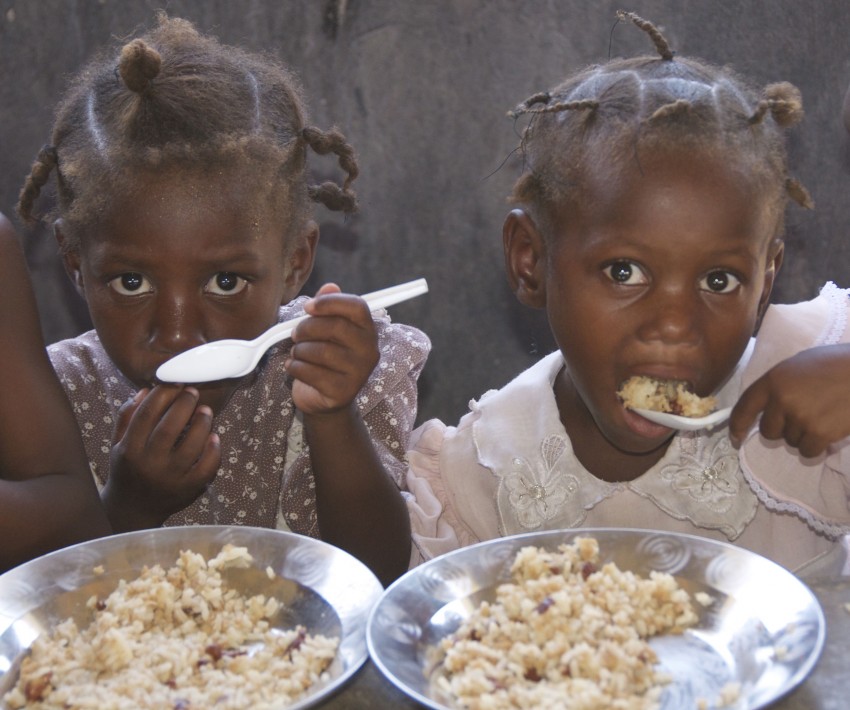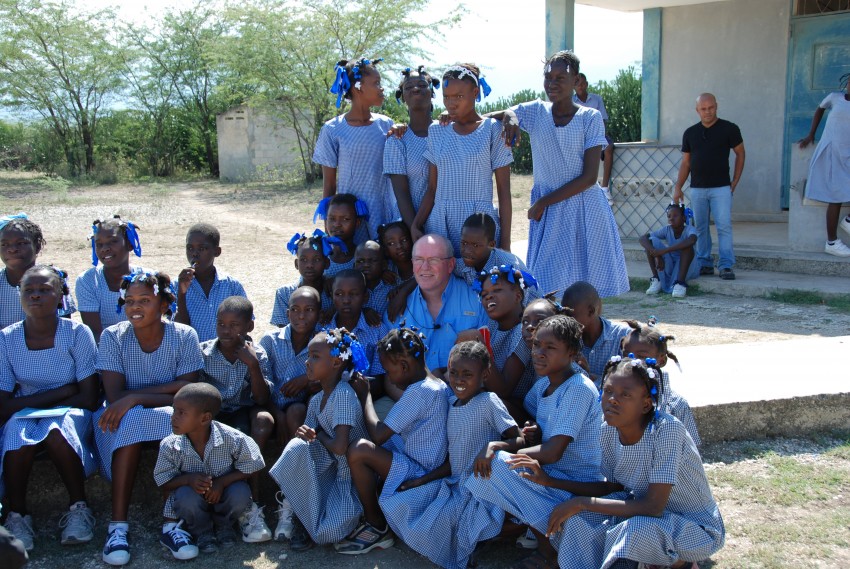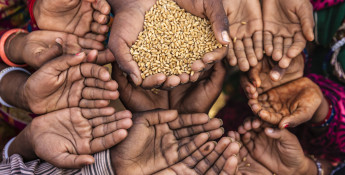By Leigh Ann Maurath on November 6, 2018
Fighting Against World Hunger
After an unforgettable encounter, Rick McNary solves an age-old problem in a new way
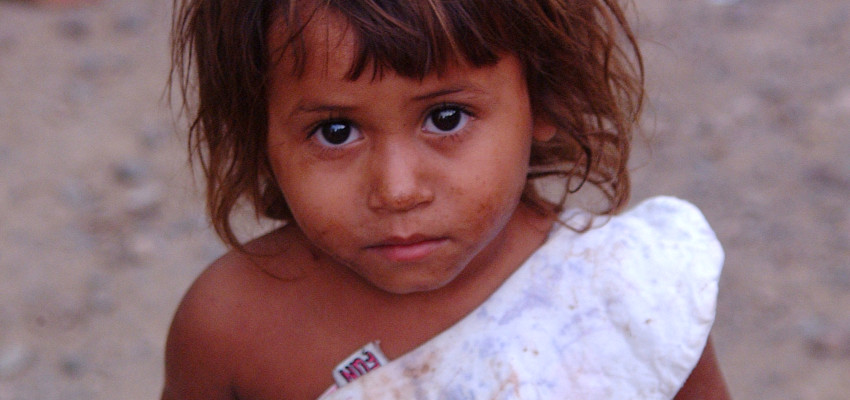
Rick McNary has a gift for telling stories. Using words, McNary can transport you to another time and place, with people you might not yet know. With each carefully chosen word, he brings life to the stories he tells. He introduces his readers to stories of neighbors, acquaintances and complete strangers. His stories draw you in and keep you hooked.
Often, the stories he tells are not of his own experiences, but rather other people’s journeys. McNary listens intently to each person he encounters because he believes everyone has a story to tell. If you sat across the table from him, you too might find a story inside you, ready to be told.
There is one experience McNary had, however, that keeps repeating in his mind.
ON A MISSION
In 2001, McNary went on his first mission trip with a team from the Potwin Christian Church, where he had served as a minister for two decades.
It was nearly 120 degrees that day in Somotillo, Nicaragua. Makeshift houses of plastic, mud and other materials surrounded him. It was evident by the rudimentary construction that if it rained outside, it also rained inside the houses.
A little girl stumbled out of a house and caught McNary’s attention. Her hair was red from malnutrition, her tummy was distended and her body was frail. He guessed she was five years old. Her hands quickly found McNary’s pockets and it was clear she was looking for money or something else that might provide hope. McNary took inventory of his belongings, decided he needed his shoes and his hat, but could part with his watch. He took off his watch and gave it to her. Her giggle stirred his heart as she ran back inside and gave it to her dad.
Her name was Maria.
Little Maria quickly returned and held up her hands to convince McNary to pick her up.
“So, I picked her up,” McNary says. “She found my face, full of sweat and just as pale as could be from the winter months of Kansas.”
The little girl rubbed her fingers all over his face out of curiosity and intrigue.
“I could smell where her hands had been,” McNary says. “It wasn’t a real endearing moment.”
But just like a good story, the plot and his heart changed quickly. McNary recounts that moment with tearful emotion.
“She threw her arms around my neck and whispered, ‘Feed me, I’m starving,’” McNary recalled.
McNary sat on the ground and wept.
The words the little girl spoke not only changed the course of his day, but also his life. In those moments, he made a promise to God and little Maria that he would spend the rest of his life doing what he could to feed hungry people.
A NEW SOLUTION
After McNary’s first mission trip, he took many teams back to Nicaragua from churches across the U.S. connected to the mission there. They would raise money in America, then buy truckloads of beans and rice in Nicaragua and deliver them to villages identified by the mission as suffering from the most acute hunger. Most of them were home to farmers who grew corn and sesame.
Farmers in rural communities of developing countries are susceptible to repeated crop devastation. Their crops might be wiped out by floods, pests, monsoons or a host of other disasters. Without crop insurance, they are left to starve. Some of the hungriest people in developing countries are farmers.
“It was a step in the right direction, but the more I did things this way, the more frustrated I became,” McNary says. “I knew within 30 days the food we supplied would be gone. Then what would they do? They had no safety nets like we do in America.”
He felt like there had to be more he could do.
“Relief is giving the people the fish, just as we were doing with the delivery of beans and rice,” McNary says. “Development, however, is teaching a man to fish.”
One is short term and one is long term. McNary wanted to be part of a long-term solution to hunger. He found his long-term solution when he saw a shipping unit of pre-packaged meals on one of his many mission trips. He learned a little church in West Virginia would have volunteers package meals, then the church would send the pre-packaged meals overseas.
That concept was intriguing to him. Once McNary got back to the states, he jumped on another plane to meet the man who started packing meals like he saw.
After McNary learned more about this concept, he found a supplier and started a 501(c)(3) public charity. He asked four friends to sit on the board, and Numana, Inc. was formed.
“And then the economy tanked in 2007,” McNary says. “You can’t start a successful nonprofit in those conditions.”
Rick struggled to launch Numana since no one he talked to, not even the board, had ever seen a meal-packaging event. He couldn’t find anyone willing to pay for the cost of an event. He continued researching, learning and building relationships with people who were working to alleviate hunger.
ALL IN
In August 2009, the Numana bank account had $209.39 and little progress to show for the funds they had already used. The promise he made to a little girl in Nicaragua played over in his mind. After two years of working part time on Numana out of his house, McNary and his wife decided it was time to go all in. They took a leap of faith, sold his photography business and focused on Numana entirely.
McNary made a call to the Salvation Army. If he gathered the money, volunteers and food, the Salvation Army would distribute the packaged meals. They discussed where to send it and they decided to send the first container to Haiti. He flew down to meet the staff and the children in the desperately hungry village of Balan, where they chose to send the food to school children.
Numana’s goal for its first event was to package a full container of meals — 285,120 meals to be exact, which would take around $80,000 to pull off. The Numana team raised more than $90,000 for the packaging event. When Dec. 29, 2009 arrived for the first event, so did 4,000 volunteers. In two days, the volunteers met Numana’s goal and made 285,120 meals for Haiti.
The spark was ignited, and people were ready to package meals again. Numana went to work on fundraising.
Then, another plot twist made its way into the story.
On Jan. 12, 2010, an earthquake hit Haiti. Because of delays in the Numana food shipment, the meals didn’t make it there before it hit. Two hours after the earthquake, McNary received a phone call from his contact at Salvation Army in Washington, D.C. Haiti needed food as soon as possible. The military would send the food down if it was still available. The food that had been packaged at Numana’s first event was located and airlifted into Haiti.
“Our food was the first of all major organizations to get to Haiti,” McNary says.
The Salvation Army asked if McNary and his team could package more containers for Haiti. They paid for supplies and Numana packed more meals that same week in El Dorado. Another 4,000 volunteers showed up — and two more containers were packed.
Five weeks after Numana’s original event, they managed to get in the Kansas Coliseum near Wichita, and with the help of more than 12,000 volunteers, they packed more than one million meals in just two days.
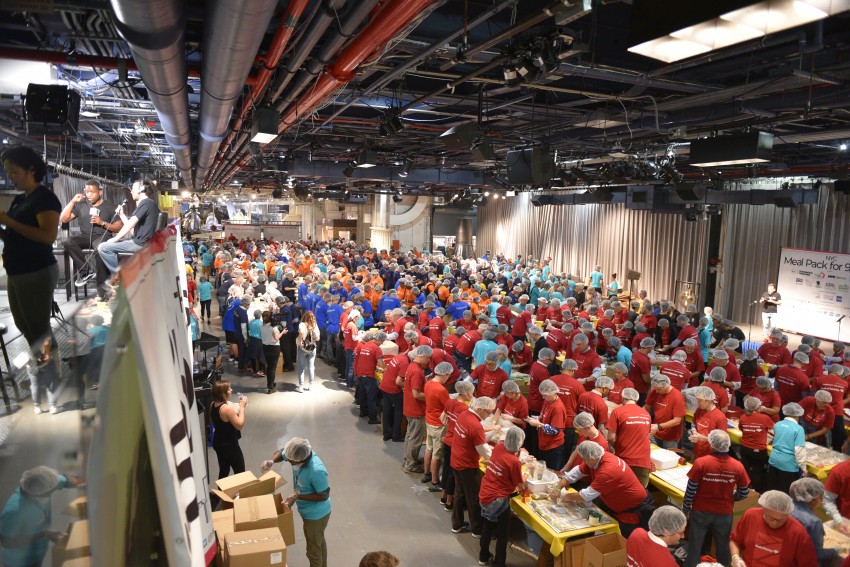 Throughout the following six months, McNary worked with the Salvation Army and Numana to package more than 20 million meals and engage more than 120,000 volunteers.
Throughout the following six months, McNary worked with the Salvation Army and Numana to package more than 20 million meals and engage more than 120,000 volunteers.
At one time, they were packaging meals in Million Meal Events in Seattle, Chicago and New York in the same weekend.
“I knew God had put this dream in my heart, and I knew he would provide everything I needed — in the way of people,” McNary says. “I knew I was in the midst of a miracle.”
The food Numana volunteers packed fell from the sky to starving people, like manna in the desert. The organization’s name had never been more fitting. And McNary never gets tired of telling that story.
NOT AN AG GUY
Numana’s story for McNary came to an end with an email informing him he was terminated from his position with the organization.
“That email broke my heart,” McNary says.
As it often happens, when one story ends, the opportunity to start a new one begins. The day after McNary received that devastating email, Outreach, the organization he had previously been purchasing his product from, called him with a job offer.
McNary could have decided to stop meal packing because of his success with the Haiti campaign and because of that email. But he made a promise to little Maria in Nicaragua and doesn’t plan to break it. He has been the VP of Outreach for six years, working on national and international expansion programs.
Along the way, he was asked to join the Alliance on Hunger board in D.C. It strives to be the voice that brings people together around the issue of hunger — the causation of hunger and possible solutions.
One of his co-committee chairs was from the National FFA Organization. He told McNary he needed to attend FFA’s national convention.
“But I am not an ag guy,” McNary says.
But McNary went, and it’s where he learned of a new story he wanted to start telling as he continued to lead meal-packing events — one about the life of farmers.
“I get so much energy from being around people who have great stories — and they don’t even know they have great stories,” McNary says.
McNary reached out to Kansas Farm Bureau and offered to write stories for Kansas Living.
“I like it because I’m not the farmer,” McNary says. “I’m on the outside looking in. I want others to see farmers are the group of people I admire more than anybody else — they are feeding the world and providing all we need.”
By 2050, farmers will have to increase production by 35 percent to meet the demands of a growing population.
“We are relying on the farm family,” McNary says. “That is why I talk to farmers and tell their stories as part of my work. I believe they are the key to ending global hunger.
“I support farmers through the stories I write about them, and also by becoming a member of Farm Bureau,” McNary says. “Helping Kansas Farm Bureau amplify their tagline, “the voice of agriculture,” through its grassroots system has been phenomenal. Kansas Farm Bureau gives room for all to speak and I wanted to be part of that.
“People look to Hollywood and professional sports to find a hero. But I encourage folks to look at farmers and make those people your heroes. They sure are mine.”
A DIFFERENT STORY
McNary continues to lead mealpacking events across the United States and write stories. He writes stories of his adventures. He writes stories of the American farmer. He writes stories about the good in the world. And he writes stories of his family.
Through his stories, McNary wants to change the conversation about hunger and farmers.
“Typically, the message of hunger is exactly what my mom told me when I was 10 years old as she put spinach on my plate and I didn’t want to eat it — ‘You know there are starving people in Africa.’ The message was — there is hunger, it’s a bad problem, it’s somewhere else and you should feel bad,” McNary says. “Guilt doesn’t motivate me over a long period — but positive things do,” he says. “I put people around tables to pack food, and at the end of the day, if you spend an hour with me, I can help you feed 2,000 people.”
Don’t you want to be a part of that story? If you do, learn how you can help with a mealpacking event by visiting www. outreachprogram.org.

